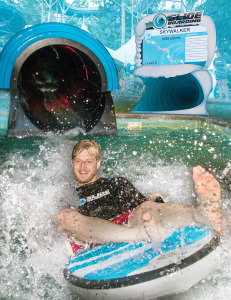WhiteWater West has figured out how to make water slides appeal to the video game generation.
The waterpark attractions maker in Richmond, British Columbia, Canada recently unveiled a concept that combines arcade-style button mashing with splashing called Slideboarding.
Here’s how it works: Participants settle into the Slideboard, a tech-equipped luge, which they’ll use to careen through the hairpin turns of the fiberglass flume that’s outfitted with a waterproof LED screen. Between the lights and music, it’s as though you’re spiraling through some sort of sci-fi vortex. To score, tap the control buttons on the board that correspond to the flashing lights whizzing by.
It’s essentially Guitar Hero: Waterpark Edition.
And, in true arcade fashion, the game becomes progressively more difficult as the rider improves. Players “level up” to increasingly challenging gameplay with each trip down the tube. That encourages repeat rides and longer stays.
Let’s face it: Kids are hard to impress these days. After a couple of runs down a slide, they’re looking for something else to do. That behavior didn’t go unnoticed in Denise Weston’s son.

“My son, when he was younger, he and his friends would come up with target ideas, such as the joints in the fiberglass,” said Weston, WhiteWater West’s director of imagination. “It was really watching kids play and understanding their gaming behavior and translating that to fiberglass and water, where it’s usually about the thrill and not the skill.”
Slideboarding, which includes a scoreboard, database system and activation panel, can be easily retrofitted to an existing slide.
Weston developed the concept with industry pioneer Rick Briggs, who is credited with patenting the very first interactive water-play system in 1989. As some of the brains behind Creative Kingdoms, a firm that invents immersive entertainment technologies, they’ve successfully paired digital gaming experiences with theme park environments in the past. Its award-winning MagiQuest, a quasi-virtual reality game that plunks players into an enchanted world where they’ll use their wits and a wand to thwart troublemaking pixies and fire-breathing dragons, is available at Great Wolf Lodge indoor waterparks.
“The reality of interactive gaming … that permeates our lives doesn’t have to be something that we think needs to be out of the waterpark industry,” said Weston, a trained psychologist and “playologist” with more than 15 years’ clinical practice and research.
Another example of WhiteWater West dipping its toes into the gaming arena is SplashQuest — a scavenger hunt of sorts that invites visitors to find and activate various interactive features throughout the park using their RFID wristbands.
While that’s a fine way to entertain guests in the park, Slideboarding allows players to take the experience with them. The game has a complementary app, so players also can rack up points between visits. When they return, those points are added to the scoreboard in the park.
Wet ‘n’ Wild Las Vegas is the first waterpark to adopt the technology, which will debut next summer.



